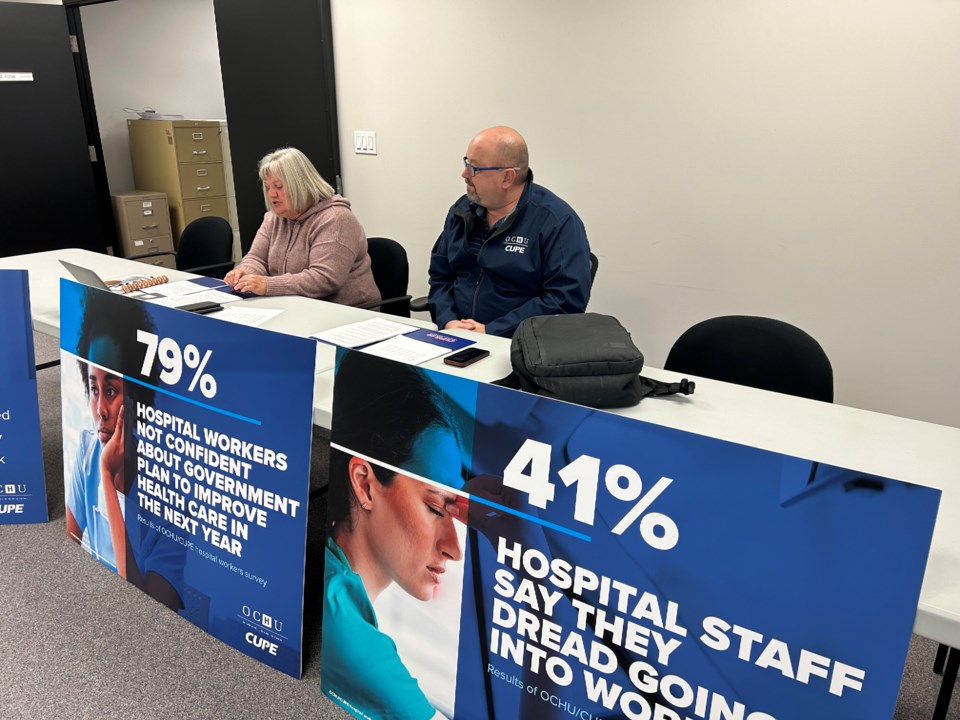Ontario Hospital unions are ringing the alarm bells after a recent poll conducted by Nanos Research reveals that 90 per cent of workers in northern Ontario hospitals say there is not enough staff and nearly half are contemplating leaving their jobs within the next year amidst high stress levels, exhaustion, and anxiety.
The polling firm Nanos Research surveyed more than 750 hospital workers represented by CUPE’s Ontario Council of Hospital Unions (OCHU/CUPE) across the province, including registered practical nurses, personal support workers, housekeepers, and clerical staff working in North Bay. OCHU/CUPE represents approximately 50,000 hospital staff across the province.
Sharon Richer, secretary-treasurer of OCHU/CUPE, based out of Sudbury, believes the sector continues to lose trained and experienced staff due to poor working conditions and eventual burnout amidst poor stewardship of the system from the Ford government.
“The results are alarming to say the least, particularly in northern Ontario," she said.
"How are we going to keep our hospitals functioning without staff?
"It’s shocking to note that the government doesn’t have a retention plan, even as we see staffing shortages contributing to a record number of ER shutdowns, and hospital service closures. The whole system depends on workers – and yet their needs continue to be neglected.”
The issue was the key topic at a CUPE-organized media conference held in downtown North Bay on Monday afternoon.
Dave Verch, first vice president of OCHU/CUPE, believes the government must invest an additional $1.25 billion annually on top of inflation for the next four years to improve staffing levels and boost capacity, which he feels will help hospitals provide services concerning population growth and an aging-related surge in demand.
While the province talks about hiring nurses as part of a solution to the crisis, Verch believes it is not enough.
"It is the common response, they are going to say they hired 15,000 new registered nurses in the last year and enrolment is up," said Verch who travelled from Ottawa for the North Bay media event.
"I mean these are all positive signs for sure but our concern is our retention piece. We are losing healthcare workers at a faster pace than we can replace them. This year alone it is 10 per cent and since COVID, it hit a high of 14.9 per cent. There are historically high rates, more than double what they were pre-COVID so we really need to put some efforts into keeping those staff that are in the hospitals, in the hospitals, and stopping the bleeding of that staff."
While Richer admits this is a provincial issue, she feels northern Ontario is possibly feeling it the most.
"I think it is relatively high because in northern Ontario we don't have the resources like they have in southern Ontario," she said.
"We don't have outside resources so people are going to hospitals. We don't have enough family doctors so where is the next place they go for care, they go to the emergency department because they are in crisis. Once all of these things start fitting together as a puzzle they become an enormous pressure on hospitals. We are seeing our emergency departments exceeding the amount of patients they can see. People are getting taken care of in hallways; hallway medicine is clearly happening and so on top of an already short staff, now you have more patients. People are just feeling so burnt out because of their workloads."
Rolled into the union’s demand to improve staffing levels is a proposal for staff-to-patient ratios in Ontario’s hospitals as a key measure to improve working conditions.
Verch pointed out that research from California - which implemented staffing ratios two decades ago - shows higher satisfaction among workers who benefit from more reasonable workloads, as well as improvement in patient care including lower mortality rates. In 2023, British Columbia became the first province in Canada to introduce nurse-to-patient ratios.
“Staffing ratios would make a huge difference by setting a minimum standard of care,” Verch said, drawing on his 30-year experience of working as an RPN.
“At a time when workers are losing faith in the system, it would offer a glimmer of hope that the government is serious about fixing this crisis.”
The unions feel the government must take other complementary measures, such as calling for fair compensation and more full-time jobs as part of a broader human resources strategy.
Highlights from the poll of northern Ontario hospital workers
- 88 per cent say they are not confident (81 per cent) or somewhat not confident (7 per cent) about the government improving the health care system in the next year.
- 90 per cent say they are not staffed well enough to deliver high-quality patient care.
- 49 per cent are considering or somewhat considering leaving the sector in the next year.
- 50 per cent of workers say they are unhappy with their compensation.
- As a result of their working conditions, 81 per cent have high stress levels, 58 per cent dread going to work, and 53 per cent say they have trouble sleeping.
